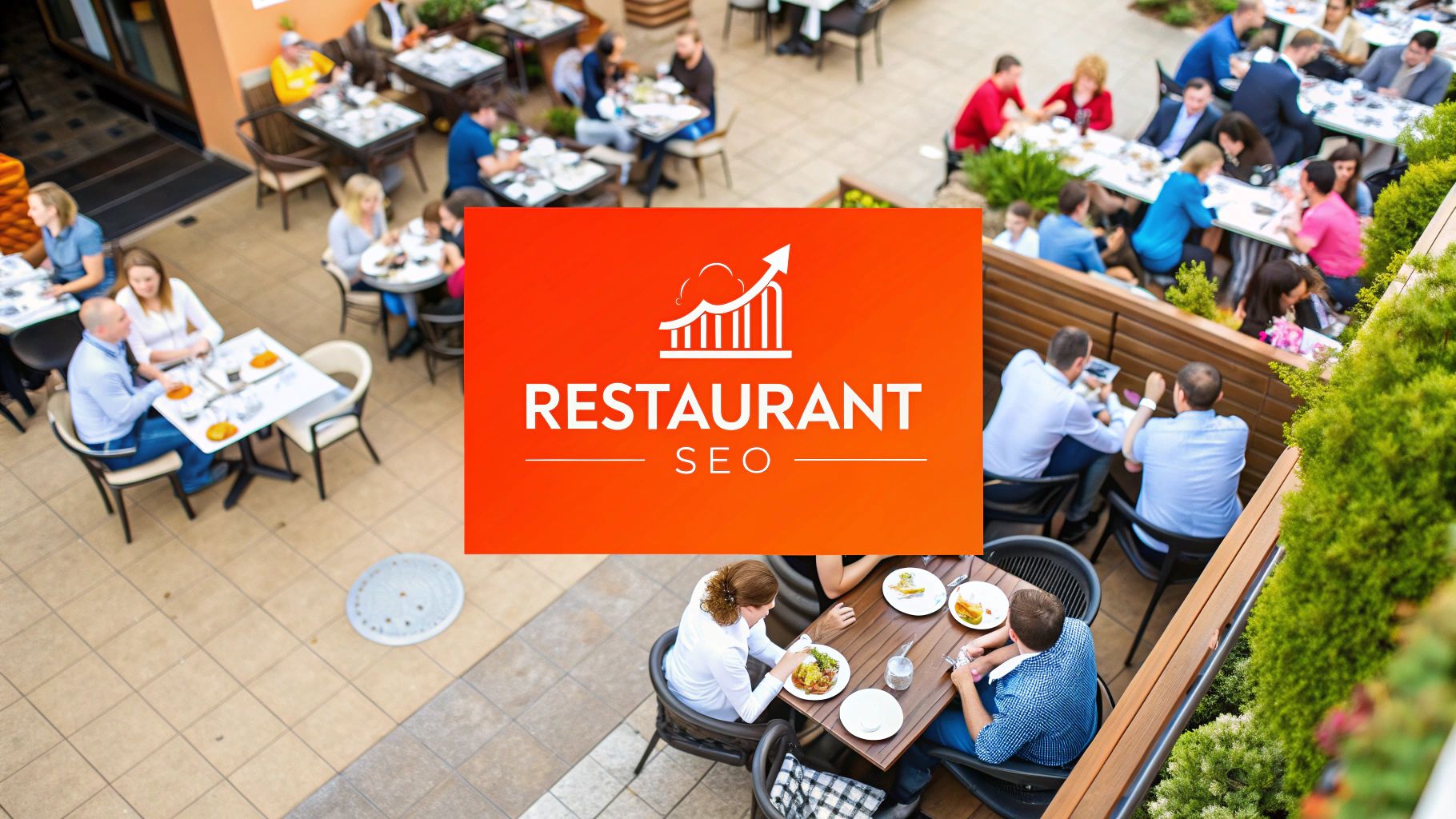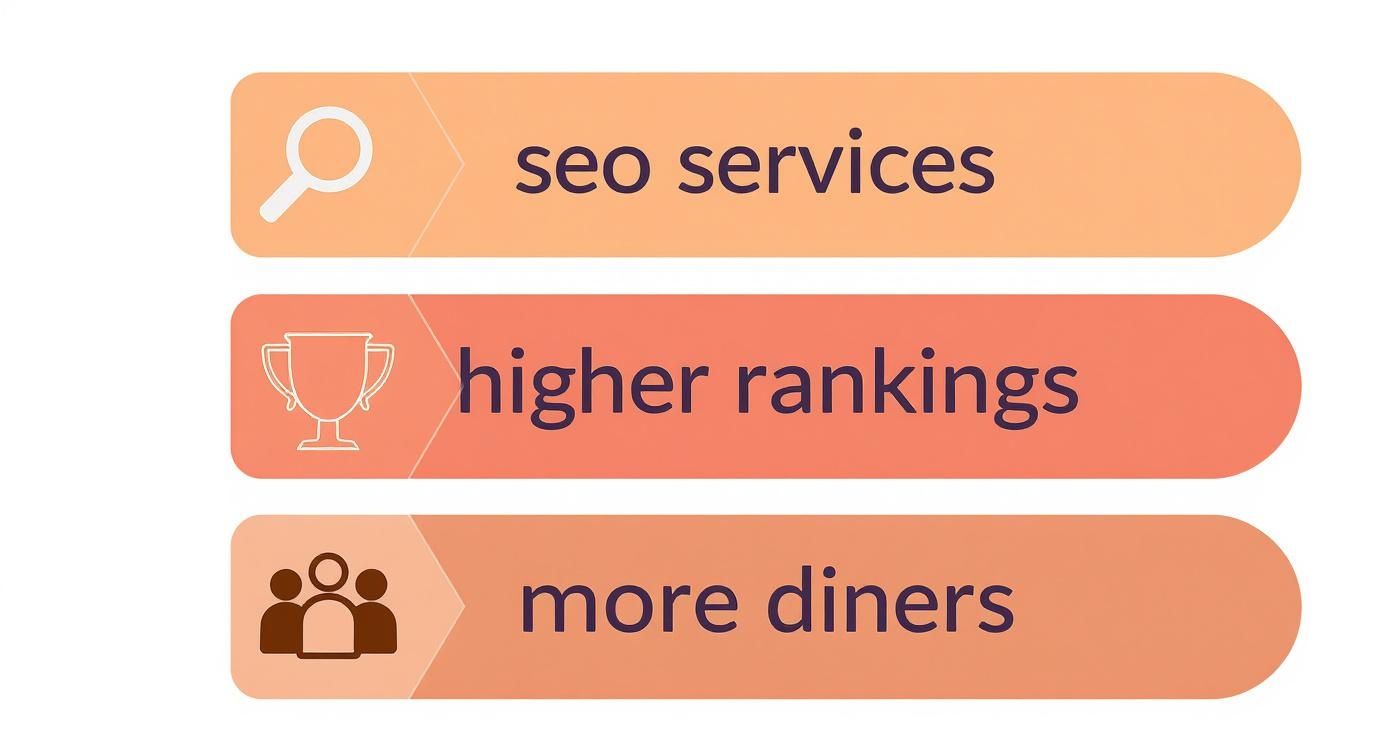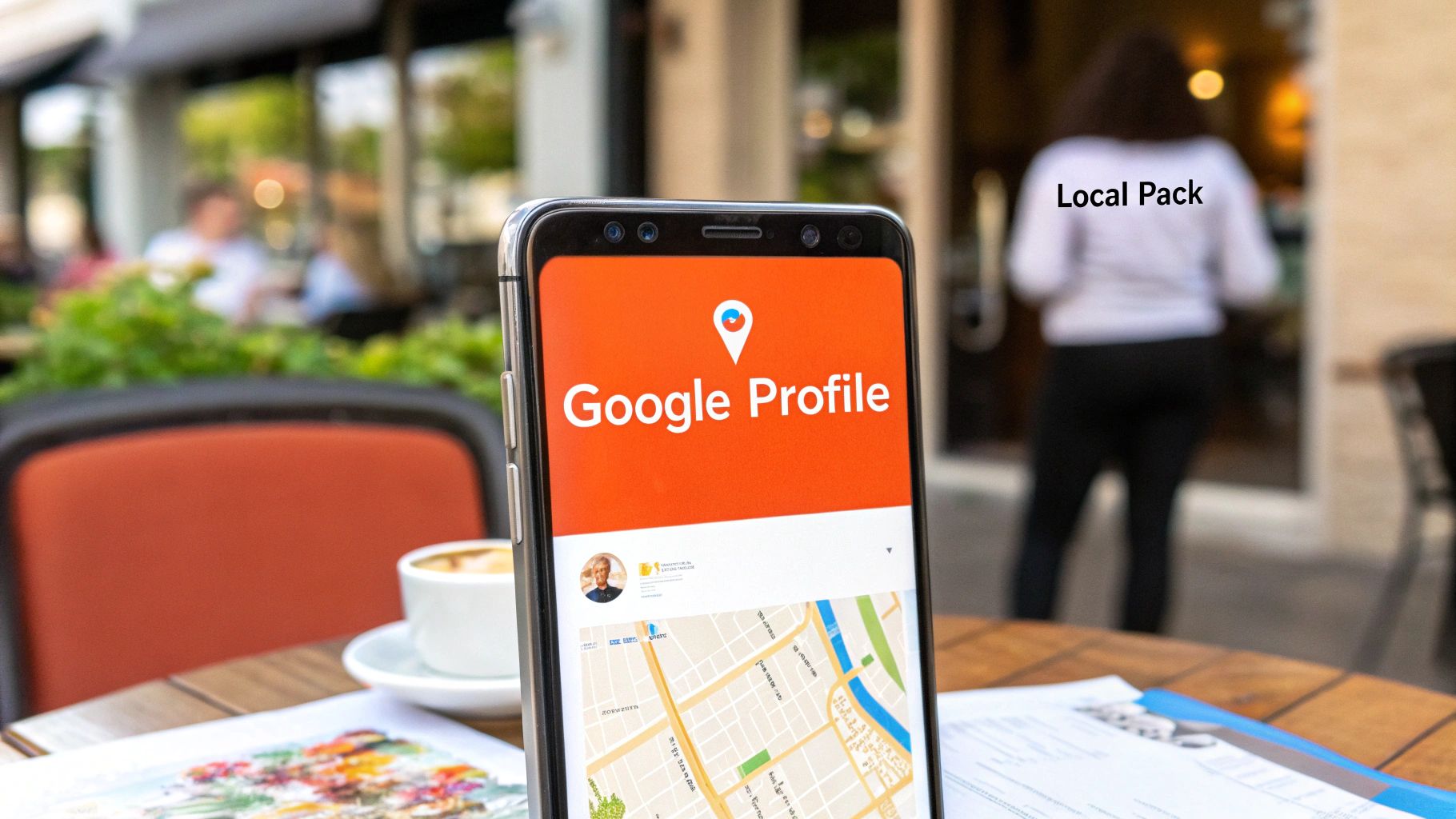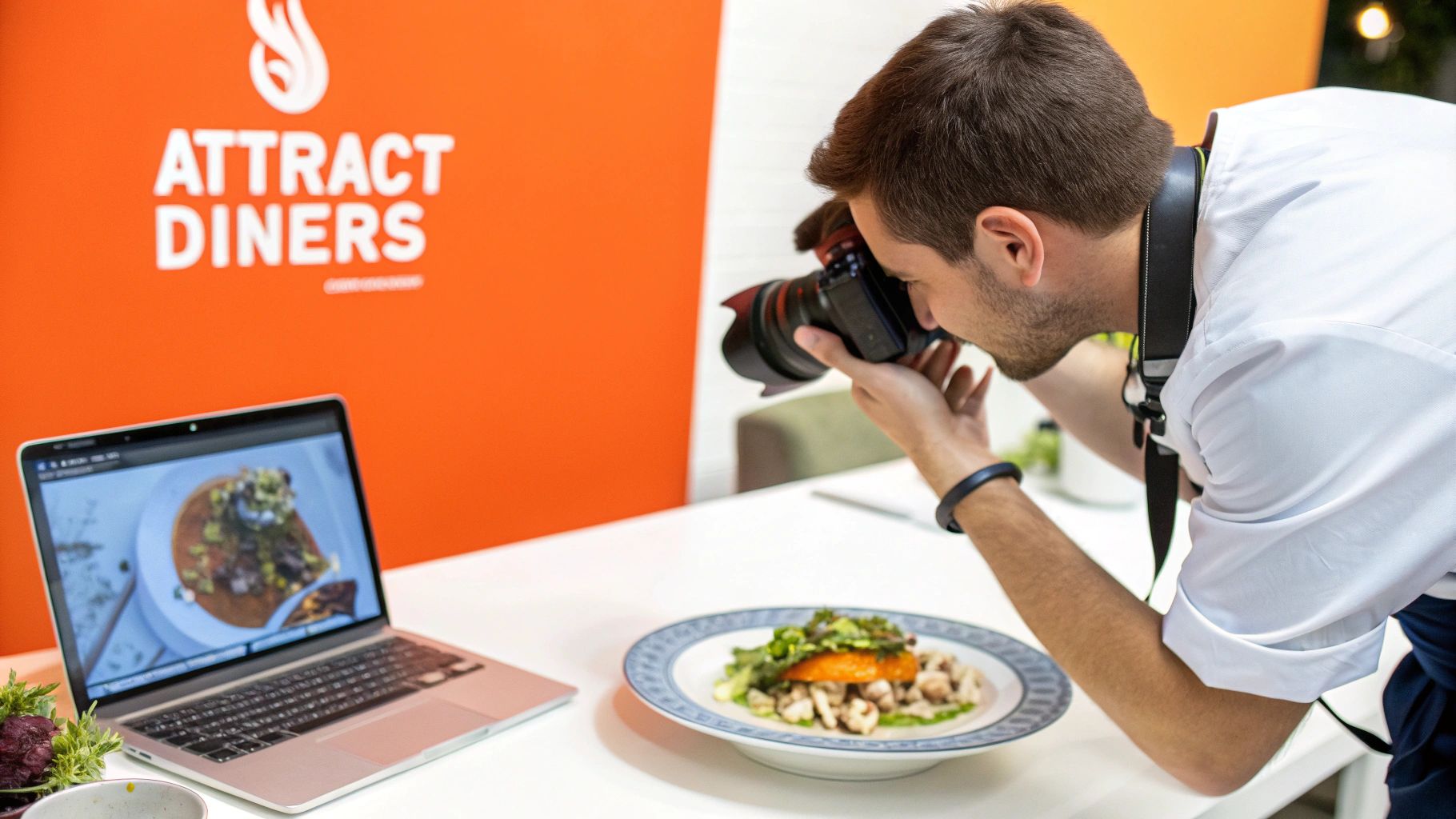
Restaurant SEO Services to Boost Diners and Traffic
When a potential customer searches for 'best tacos near me,' will they find your place or the one down the street? That's where restaurant SEO services come in. Think of it as your digital maître d', guiding hungry diners straight to your door instead of letting them wander over to the competition.
Why Your Restaurant Isn't Getting Found Online
Imagine the internet is a massive, bustling food hall. Right now, your restaurant might be tucked away in a quiet corner with no signs, making it nearly invisible to the crowds looking for their next meal.
A smart SEO strategy is like grabbing the best spot right at the entrance, complete with bright neon signs pointing everyone your way. It’s no longer some technical chore; it's a core part of running a successful restaurant today. If you don't have a strong online presence, you're missing out on a huge slice of your potential customer base.
The Power of Local Search
Modern diners don't just happen upon new places anymore—they search for them online first. This reality makes your ranking in search results incredibly important.
The numbers don't lie. A staggering 90% of diners around the world research restaurants online before deciding where to eat. Even more telling, 64% of those people click on one of the top three local search results. You can find more insights like this on bizplanr.ai.
This data paints a very clear picture: if you're not in those top spots, most potential customers will never even know you exist. That means lost revenue and slower growth, plain and simple.
Sure, paid ads can give you a temporary boost, but they often fall flat without a solid SEO foundation—a common reason behind many failed ad campaigns.
Ultimately, professional SEO for your restaurant leads directly to higher local rankings, more online reservations, and a real-world increase in foot traffic. It's what sets the stage for long-term growth in a tough industry.
The Four Pillars of a Winning Restaurant SEO Strategy
A truly effective SEO strategy for a restaurant isn’t one single trick. It’s a lot like a perfectly crafted recipe, where four key ingredients work together to create something amazing. Get the balance right between these four pillars—On-Page, Local, Content, and Technical SEO—and you'll build a powerful system that consistently turns online searches into booked tables.
When a team specializing in restaurant SEO services gets these components humming, they create a serious engine for growth.
Let's break down what goes into a winning strategy. We can think of these four pillars as the foundation for getting your restaurant found online. Each one has a specific job, and they all support each other.
To make this clearer, here's a quick overview of what each component does and what it looks like in the real world for a restaurant owner.
Key Components of Restaurant SEO Services
| SEO Component | Primary Goal | Actionable Example for a Restaurant |
|---|---|---|
| On-Page SEO | Make it crystal clear to Google what your website is about. | Changing a generic page title from "Menu" to "Authentic Italian Pasta and Pizza Menu | Tony's Trattoria". |
| Local SEO | Show up for customers searching for restaurants in your immediate area. | Actively managing your Google Business Profile by responding to reviews and adding new food photos weekly. |
| Content SEO | Build a connection with your community and attract diners with engaging stories. | Writing a blog post titled, "Meet the Local Farmers Who Supply Our Kitchen," to appeal to people searching for "farm-to-table restaurants in Austin." |
| Link Building | Build your website's authority and credibility in Google's eyes. | Getting featured in a local food blogger's "Top 10 Brunch Spots in the City" article with a link back to your website. |
Now that we have the big picture, let's dive a little deeper into how each of these pillars actually works to bring more people through your door.
On-Page SEO: Getting the Basics Right on Your Website
Think of On-Page SEO as setting up your restaurant's digital storefront. It’s about making sure all the information on your website itself is perfectly organized so search engines can instantly understand what you're all about. It's the online equivalent of having a clear, easy-to-read sign out front.
This means strategically using keywords—the terms people are actually searching for—in your page titles, headings, and descriptions. When someone types "best brunch downtown" into Google, proper On-Page SEO is what helps Google confidently say, "Hey, this restaurant's brunch page is exactly what you're looking for!"
Actionable Insight: Go to your menu page right now. Is the title tag (the text that shows up in the browser tab) just "Menu"? Change it to something specific like "Seasonal Farm-to-Table Menu | The Gilded Spoon | Houston, TX." This simple change tells both customers and Google your cuisine, name, and location.
Local SEO: Winning Over the Neighborhood
For any restaurant, this is the big one. Local SEO is non-negotiable. Why? Because the overwhelming majority of your customers are looking for a place to eat right now, right here. They're using search terms like "restaurants near me" or "sushi in Brooklyn."
This is where your Google Business Profile (GBP) becomes your most powerful marketing tool. It’s your digital billboard on Google Search and Google Maps, often the very first thing a potential diner sees.
This infographic really drives home how expert SEO management turns that online visibility into actual foot traffic.

As you can see, the path from optimization to a full dining room is direct. The most important actions here include:
- Claiming and Polishing Your GBP: Making sure your restaurant's name, address, phone number (NAP), and business hours are 100% correct and consistent across the web is step one. Practical Example: Double-check your holiday hours. Nothing creates a bad experience faster than a customer showing up to a closed restaurant because your GBP was wrong.
- Generating Reviews: Positive reviews are pure gold. They build trust like nothing else. In fact, over 70% of consumers now trust online reviews as much as a recommendation from a friend.
- Building Local Citations: This just means getting your restaurant listed on important local directories and sites like Yelp, TripAdvisor, and local city guides. It reinforces to Google that you're a legitimate, established local business.
Content Marketing: Telling Your Unique Story
Your restaurant is more than just a menu and four walls. You have a story, a unique vibe, and a connection to your community. Content marketing is how you share that with the world. It’s about creating interesting, helpful, or entertaining content that gives people a reason to choose you over the competition.
A great content strategy doesn't just sell; it solves problems and builds relationships. It answers the questions your potential customers are asking and establishes you as the go-to expert on food in your neighborhood.
Actionable Insight: Run a seafood restaurant? Write a blog post titled, "How to Shuck an Oyster Like a Pro: A Step-by-Step Guide from Our Chef." This is useful, shareable content that also positions you as an expert and can attract people searching for seafood-related tips.
Technical SEO: Making Sure Everything Runs Smoothly
Finally, we have Technical SEO. This is all the behind-the-scenes work that makes sure your website is fast, secure, and easy for Google to understand. If a potential customer clicks on your site and it takes forever to load or doesn't work on their phone, they're gone. And Google notices that, too.
A huge piece of this puzzle is something called schema markup. It’s a bit of code you add to your site that acts like a translator for search engines, clearly labeling information like your star ratings, price range, and menu highlights. This is what allows Google to show that juicy information right in the search results.
Practical Example: With the right schema, when someone searches for your restaurant, Google can show your average review rating (e.g., ★★★★☆ 4.5/5) and price range ($$) directly in the search results, helping you stand out before they even click.
And never underestimate the power of speed. A website that loads in just one second sees a conversion rate 3x higher than a site that takes five seconds to load. In the restaurant business, that's the difference between a booked table and a lost customer.
Master Your Google Business Profile to Win Local Search
Think of your website as your restaurant's digital home. If that’s the case, your Google Business Profile (GBP) is its front door. It’s that information-packed snapshot that pops up in Google Maps and the all-important "Local Pack"—the box of three businesses you see for searches like "tacos near me." Not paying attention to it is like locking your front door right before the dinner rush.

So many restaurant owners just claim their profile and then forget about it. That's a huge mistake. A fully optimized GBP is a living, breathing tool for pulling in hungry diners. This is exactly why professional restaurant SEO services make it a top priority, constantly feeding it new information to show Google that your business is active and relevant. It’s how you go from just being on the map to owning your local search results.
Of course, the first step is getting your profile set up and verified correctly. For a detailed walkthrough, this guide is a fantastic resource: Adding Your Business to Google: Guide for Local Success.
Turning Your Profile into a Customer Magnet
Once you've claimed and verified your profile, the real fun begins. Your mission is to make it the single most helpful and engaging resource for anyone searching for a place to eat. Every feature on your profile is a chance to answer a potential customer's question before they even have to ask it.
Here are a few actionable ways to make your GBP shine:
- Upload High-Quality, Geotagged Photos: Don't just post a picture of your front door. Get vibrant, drool-worthy shots of your signature dishes, your cozy dining room, and your team in action. Practical Example: Take a photo of your new cocktail special on your phone. Before you upload it to GBP, make sure your phone's location services are on. This automatically geotags the photo, giving Google another strong signal about where you are.
- Use Google Posts: This is basically a free mini-blog right on your search listing. Announce your happy hour, shout out a weekend special, or show off a new seasonal cocktail. A quick post like, “This week only: 50% off all appetizers from 4-6 PM!” can be all it takes to get someone in the door.
- Turn on Direct Messaging: Let people message you right from your profile. It’s perfect for quick questions about wait times or allergy concerns. That simple convenience can easily turn a casual question into a reservation.
Proactively Engage and Inform
A great GBP isn't a "set it and forget it" kind of thing. It’s an ongoing conversation with your community. When you're actively engaged, you're sending powerful signals to Google that your restaurant is open, popular, and cares about its customers—all things that help you rank higher.
Answering questions and responding to reviews isn't just about good customer service. It’s a public display of your brand's personality and commitment. You're showing both future diners and Google that you're on top of your game.
Keep these ongoing tasks on your radar:
- Manage the Q&A Section: People will post questions directly on your profile. Get in there and answer them quickly. Actionable Insight: Create a list of the 5-10 questions you get asked most often (parking, reservations, etc.). Post these questions yourself on your GBP and then immediately answer them. This provides instant value to potential customers.
- Encourage and Respond to Reviews: Don't be shy about asking happy customers to leave a review. But more importantly, respond to all of them—good and bad. Practical Example: For a negative review about slow service, respond with: "Hi [Name], thank you for your feedback. We're so sorry your experience wasn't up to our standards. We were short-staffed on Saturday but are taking steps to fix this. We'd love for you to give us another try." This shows you're listening and proactive.
By consistently using these features, your Google Business Profile becomes more than just a listing. It becomes your most powerful tool for attracting local customers.
Creating Content and Links That Attract Diners
If on-page SEO is the menu and local SEO is the sign on your door, then great content is the irresistible aroma wafting out onto the street. It’s what grabs people’s attention and makes your restaurant the place they have to try. This isn’t just about listing your specials; it’s about sharing your story in a way that connects with hungry customers and, just as importantly, with Google.

This is where professional restaurant SEO services really shine. The entire point is to create content that answers the questions potential diners are asking before they even think to ask them. Think of your blog as an extension of your dining room—a place to share the passion and personality that make you unique.
Crafting Content That Connects
Your online content should be crafted with the same care you put into your signature dish. The trick is to get inside the head of your ideal customer. What are they searching for besides "best tacos near me"? They might be looking for a great spot for a first date, wondering what wine pairs with your pasta, or curious about where you source your ingredients.
Here are a few actionable content ideas:
- "Our Top 5 Romantic Date Night Dishes": This targets couples searching for "date night restaurants" and showcases your best offerings for that audience.
- Video: "Behind the Bar: How to Make Our Signature Old Fashioned": A short, engaging video that appeals to cocktail lovers and can be shared easily on social media.
- "A Guide to the Best Gluten-Free Options on Our Menu": This is incredibly helpful for diners with dietary restrictions and can help you rank for specific searches like "gluten-free Italian food near me."
And of course, social media is a massive piece of this puzzle. A mouth-watering photo on Instagram can be the final nudge someone needs to make a reservation. In fact, research shows a staggering 74% of diners use social media to help them decide where to eat, and about 40% have tried a new spot simply because they saw photos of the food online.
Good content doesn't just sell a plate of food; it sells an entire experience. It makes people feel like they know and trust you before they even walk through the door.
Building Links and Local Authority
Think of link building as getting a stellar recommendation from a respected local food critic. When another credible website links to your restaurant’s site, Google takes that as a huge vote of confidence. It tells the search engine you’re a legitimate, authoritative player in your local scene, which can dramatically boost your rankings.
The most effective link-building strategies are woven into your local community. For a deeper look at how to pull this off, check out these top content marketing tips for small businesses.
Here are a few practical ways to earn those valuable backlinks:
- Partner with Local Food Bloggers: Invite influential foodies for a meal on the house. An honest review on their blog (with a link back to your site) is worth its weight in gold.
- Collaborate on a "Dinner and a Show" Promotion: Team up with a local theater or music venue. When they promote the package deal, you get a natural backlink from their website.
- Sponsor a Community Event: Sponsoring a local charity 5k or a neighborhood festival almost always gets your restaurant’s logo and a link on the event page.
These aren’t just one-off marketing tactics; they’re relationship-building efforts that create a web of trust that both customers and search engines reward. If you're looking to plan these kinds of initiatives, understanding the a content strategy agency approach can provide a solid framework.
How to Choose the Right Restaurant SEO Partner
Picking an agency to handle your restaurant's online presence is a huge decision. It's not just about marketing; it's about putting a critical part of your business in someone else's hands.
With the global SEO services market expected to hit $92.74 billion, it feels like a new agency offering restaurant SEO services pops up every day. That makes it incredibly tough to separate the real experts from the crowd.
A fantastic partner doesn’t just bring you website clicks; they bring you paying customers who fill your tables. On the flip side, a bad one can burn through your budget and, in the worst cases, actually damage your reputation with Google.
Key Questions to Ask Any Potential Agency
Before you even think about signing a contract, you need to vet any potential partner thoroughly. Their answers to a few pointed questions will tell you everything you need to know about their experience, their process, and whether they genuinely get the restaurant world.
Walk into that first meeting ready to ask these questions:
- Can you show me case studies from restaurants like mine? Getting results for a small local cafe is a world away from promoting a high-end fine dining spot. You need to see proof that they've successfully helped businesses with a similar concept, cuisine, and target audience. Practical Example: If you run a pizzeria, ask them, "Show me how you increased online orders for another pizza place."
- How do you actually measure and report on success? If you get a vague answer like "we'll get you more traffic," that's a major red flag. A pro will talk about metrics that matter to a restaurant: an increase in online reservations, more phone calls from your Google Business Profile, and higher rankings for money-making local searches like "best tacos in [your city]."
- What's your strategy for link building and content? Don't let them get away with technical jargon. Ask for real-world examples. You're looking for answers that involve building relationships with local food bloggers or creating content that your community would actually want to read, not just keyword-stuffed articles.
Spotting the Red Flags Immediately
Knowing what to look for is only half the battle; you also need to know what to run from. Some agencies still use old, risky tactics that can get your website penalized by search engines, setting you back months or even years.
Be extremely cautious of any agency that promises guaranteed results. SEO is always changing, and no one can honestly guarantee a #1 spot on Google. Real experts focus on steady, sustainable growth and clear communication—not on making impossible promises.
Keep your eyes peeled for these warning signs:
- Guaranteed #1 Rankings: This is the oldest snake-oil pitch in the SEO book. It's an immediate sign you're dealing with someone who either doesn't know what they're doing or is willing to mislead you.
- A Lack of Transparency: If an agency is cagey about their methods or sends you reports filled with confusing data you can't understand, it's time to walk away.
- "One-Size-Fits-All" Packages: Your restaurant is unique. Any partner offering a generic package without first digging into your specific goals and challenges isn't truly invested in seeing you succeed.
Understanding Common Pricing Models
Finally, let's talk about money. You need to understand how you'll be charged for these services so you can manage your budget effectively. Most SEO agencies stick to a couple of common models. For a more in-depth look, you can check out our guide on digital marketing agency costs.
- Monthly Retainer: This is the industry standard. You pay a set fee every month for continuous SEO work, which usually covers everything from content and link building to technical fixes and monthly reporting. This model is built for long-term, sustainable growth.
- Project-Based Fee: This involves paying a one-time fee for a specific, defined task. Think of it like hiring a specialist for a single job, like a deep technical SEO audit or a complete overhaul of your Google Business Profile. It's a great option if you need targeted help but aren't ready to commit to an ongoing plan.
Got Questions About Restaurant SEO? We’ve Got Answers.
Jumping into the world of restaurant SEO services can feel like learning a whole new menu. It's a big step for your business, and it's totally normal to have a few questions before you place your order.
Let's clear up some of the most common things restaurant owners ask. We'll give you straight-up answers to help you understand the process, set the right expectations, and see the real value a solid SEO plan brings to the table.
How Long Does SEO Take to Show Results?
This is the big one, isn't it? The honest-to-goodness answer is that it's a marathon, not a sprint. SEO is like slow-cooking a brisket; you can't rush it and expect amazing results. It takes time and consistent care.
Generally, you’ll start seeing some positive signs—like better rankings and more website visitors—within 3 to 6 months. This initial period is all about getting your house in order: fixing technical glitches, beefing up your Google Business Profile, and laying the groundwork with good content.
Think of the first few months as building momentum. You're laying the foundation for long-term success, not just chasing a quick, temporary boost. The really meaningful results, the kind that lead to a steady stream of reservations, usually start kicking in after that six-month mark.
What Is the Difference Between SEO and Paid Ads?
The easiest way to think about this is to compare it to real estate.
- SEO is like buying a house. It's a long-term investment. You put in the work upfront and keep up with maintenance, but over time you build real equity. Your top rankings become a valuable asset, bringing in new customers without you having to pay for every single click.
- Paid ads are like renting an apartment. The minute you stop paying, you're out. They give you instant visibility, which is fantastic for short-term goals like promoting a Mother's Day brunch or a new seasonal menu. But they don't build any lasting value on their own.
Actionable Insight: Use paid ads for time-sensitive promotions. For example, run a Google Ad campaign for two weeks leading up to Valentine's Day targeting "romantic dinner for two." Use SEO year-round to build your ranking for broader terms like "best Italian restaurant."
Can I Do Restaurant SEO Myself?
Of course! You can absolutely tackle the basics on your own, and it's a great way to get a feel for how it all works. Simple things like claiming your Google Business Profile, asking happy customers for reviews, and sharing great food photos are powerful moves you can make today.
But bringing in a professional agency that lives and breathes restaurant SEO services is a different ballgame. They handle the tricky technical stuff, dive deep into what your competitors are doing, and have the tools and time to build out content and link strategies. It's like the difference between being a passionate home cook and having a professionally trained chef running your entire kitchen.
Ready to turn online searches into booked tables? The team at Reddit Agency specializes in creating authentic conversations and driving real-world results for businesses like yours. Learn how we can help you connect with your next loyal customer.